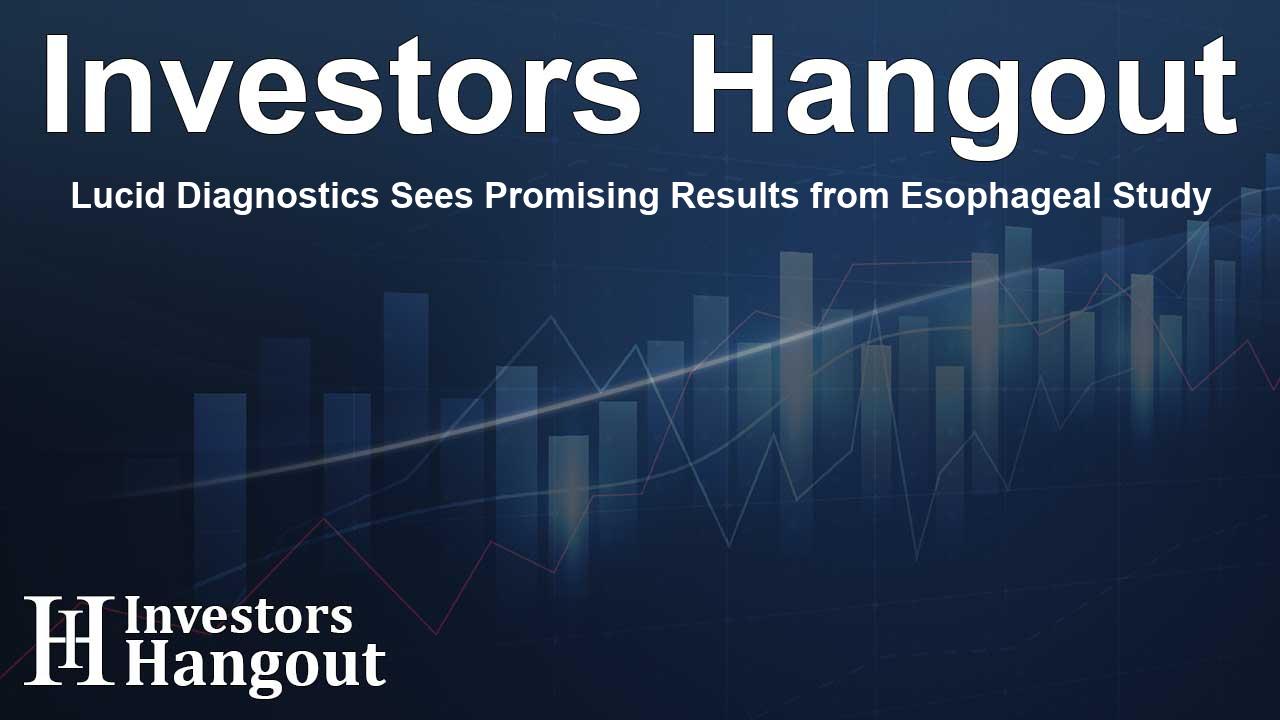Lucid Diagnostics Sees Promising Results from Esophageal Study

Exciting Clinical Findings in Esophageal Cancer Prevention
In a remarkable advancement in cancer diagnostics, Lucid Diagnostics Inc. has announced that its esoGuard esophageal DNA test has showcased outstanding clinical utility. The latest study, part of the Clinical Utility of EsoGuard (CLUE) initiative, demonstrates an impressive 85% patient compliance rate in following up with confirmatory upper endoscopy after undergoing the esoGuard screening.
Study Highlights and Patient Impact
The study’s results emphasize the critical role esoGuard plays as a triage tool for patients at risk of esophageal precancer. The analysis involved over 500 patients who met gastroenterology society guidelines for screening. Findings revealed that all patients who received a positive esoGuard result were referred for further evaluation through endoscopy, showcasing a significant provider decision impact.
Clinical trials like the CLUE study are pivotal in shaping the future of cancer detection, particularly in esophageal diseases. With a high compliance rate among those advised for additional testing, the esoGuard not only offers early detection but also encourages patients to act on their health needs.
Insights from Lucid’s Chief Medical Officer
Victoria T. Lee, M.D., the Chief Medical Officer at Lucid, expressed gratitude towards the investigators across eight clinical centers for their dedication to preventing esophageal cancer. She stated, "The final results from the CLUE study support esoGuard as an effective tool for triaging patients, giving physicians the essential means to refer at-risk individuals efficiently. This study underlines the importance of proper follow-up protocols in enhancing patient outcomes."
The Significance of Patient Compliance
The study's results emphasized the vital nature of compliance in preventive health measures. With an 85% follow-up rate, which notably exceeds previous reports, it indicates that patients are responding positively to their physicians' recommendations regarding potential follow-up procedures like upper endoscopy.
What Lies Ahead for Lucid Diagnostics
The forthcoming publication in a peer-reviewed journal will bring to light further details regarding the findings. This is Lucid’s fourth peer-reviewed publication highlighting the utility of the esoGuard test since its launch. Such rigorous evaluation helps reinforce the validation of their diagnostic tools.
Lucid's focus on gastroesophageal reflux disease (GERD) patients at risk for esophageal cancer positions them well in the field of cancer prevention diagnostics. The esoGuard test, used in conjunction with the EsoCheck device, represents a promising development in battling esophageal precancer effectively.
Innovations in Cancer Detection
As the medical field continues to evolve, tools like esoGuard become increasingly relevant. They not only aid in earlier detection of precancerous conditions but also save patients from unnecessary invasive procedures. The integration of non-invasive testing methods enhances patient comfort and adherence to follow-up recommendations.
Lucid Diagnostics plans to continue its mission of addressing esophageal cancer risks through innovative technology and further studies aimed at understanding the full spectrum of patient outcomes tied to the esoGuard system.
Conclusion and Next Steps
With the results of the CLUE study set to be published in an esteemed medical journal, Lucid Diagnostics is poised to strengthen its impact on cancer prevention strategies. As they work diligently to expand their offerings and continue their research, patient outcomes in esophageal care are likely to see significant improvements.
Frequently Asked Questions
What is the esoGuard test?
The esoGuard test is a non-invasive esophageal DNA test developed to detect potential precancerous conditions in patients at risk of esophageal cancer.
What were the compliance rates observed in the study?
The CLUE study demonstrated an exceptional 85% patient compliance rate with follow-up referrals after positive esoGuard results.
How does esoGuard impact clinical decision-making?
All patients with positive esoGuard results were referred for further evaluation, indicating a strong provider impact in guiding patient care decisions.
Who conducted the CLUE study?
The CLUE study involved collaboration across eight clinical centers, engaging both patients and healthcare providers in the evaluation of esoGuard.
What does this mean for the future of esophageal cancer prevention?
The positive results from the study support esoGuard as a valuable tool in early detection and prevention strategies, potentially lowering rates of esophageal cancer.
About Investors Hangout
Investors Hangout is a leading online stock forum for financial discussion and learning, offering a wide range of free tools and resources. It draws in traders of all levels, who exchange market knowledge, investigate trading tactics, and keep an eye on industry developments in real time. Featuring financial articles, stock message boards, quotes, charts, company profiles, and live news updates. Through cooperative learning and a wealth of informational resources, it helps users from novices creating their first portfolios to experts honing their techniques. Join Investors Hangout today: https://investorshangout.com/
Disclaimer: The content of this article is solely for general informational purposes only; it does not represent legal, financial, or investment advice. Investors Hangout does not offer financial advice; the author is not a licensed financial advisor. Consult a qualified advisor before making any financial or investment decisions based on this article. The author's interpretation of publicly available data shapes the opinions presented here; as a result, they should not be taken as advice to purchase, sell, or hold any securities mentioned or any other investments. The author does not guarantee the accuracy, completeness, or timeliness of any material, providing it "as is." Information and market conditions may change; past performance is not indicative of future outcomes. If any of the material offered here is inaccurate, please contact us for corrections.